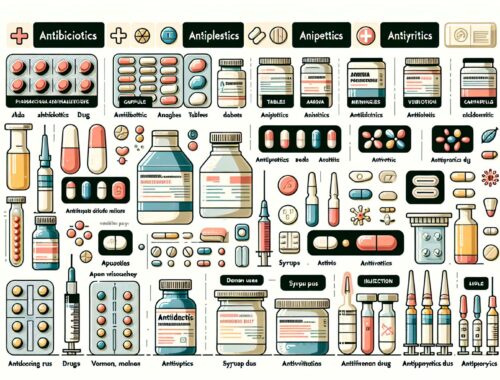
Different Types of Medicines
Medicines play a significant role in maintaining our health and treating various ailments. They come in different forms and serve different purposes, but all share the common goal of improving our well-being. In this article, we will explore the different types of medicines available and how they contribute to our healthcare system.
Introduction
Medicines can be broadly classified into several categories based on their composition, application, and mode of action. Each category has its unique characteristics and is designed to target specific health conditions. Understanding the different types of medicines will help us make informed decisions about our healthcare.
Body
1. Over-the-Counter (OTC) Medicines
OTC medicines are the most easily accessible and widely used medications. They are available without a prescription and can be purchased directly from pharmacies or stores. These medications are primarily used to relieve common symptoms such as headaches, cold, allergies, and minor pain. OTC medicines provide quick relief and are generally considered safe when used according to the instructions.
2. Prescription Medicines
Prescription medicines are prescribed by a licensed healthcare professional, typically a doctor or specialist. These medications are more potent and often used to treat complex or chronic health conditions. Prescription medicines require a written order from a healthcare provider and are dispensed by licensed pharmacies. It is crucial to follow the prescribed dosage and duration to ensure proper treatment and minimize any potential side effects.
3. Antibiotics
Antibiotics are a specific class of medications used to treat bacterial infections. They work by killing or inhibiting the growth of bacteria, allowing our immune system to effectively fight off the infection. It is essential to complete the full course of antibiotics as prescribed by the healthcare provider to prevent antibiotic resistance and ensure complete eradication of the infection.
4. Analgesics
Analgesics, commonly known as painkillers, are medications used to relieve pain. They can be either OTC or prescription medicines, depending on their strength and intended use. Analgesics work by blocking pain signals in the nervous system or reducing inflammation. However, it is important to use them responsibly and avoid long-term dependence or misuse.
5. Vaccines
Vaccines are a critical component of preventive medicine. They help our bodies develop immunity to specific diseases, protecting us from future infections. Vaccines contain weakened or inactivated forms of pathogens or their specific proteins, which stimulate our immune system to generate the necessary defenses. Vaccines have played a pivotal role in eradicating or controlling various infectious diseases throughout history.
6. Specialty Medicines
Specialty medicines are a specialized class of medications used to treat complex or rare conditions. They often require specialized handling, administration, and monitoring. These medications are typically prescribed by specialists, and their usage requires close coordination between healthcare providers and patients.
Conclusion
Medicines come in various forms, from over-the-counter remedies to highly specialized treatments. The different types of medicines cater to specific health conditions and play a crucial role in our healthcare system. Whether it’s an OTC medicine for minor ailments or a prescription medication for a chronic condition, it is important to use medicines responsibly, follow healthcare provider instructions, and seek professional advice when needed. With a better understanding of the different types of medicines available, we can make informed decisions about our health and well-being.
You May Also Like

Understanding the Different Types of Medicines
January 3, 2024
Exploring the World of Medicine: Types and Uses
March 3, 2024

